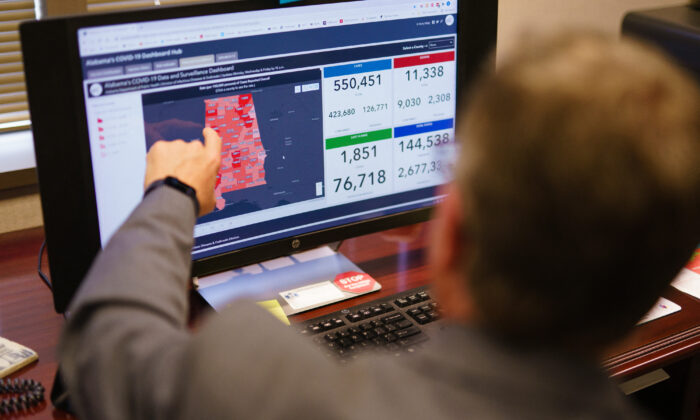The federal government’s sudden rationing of monoclonal antibody treatments, which keep Americans who get COVID-19 out of hospitals, is hitting Alabama hard, with some sites already running out of or projected to run out of supply soon.
The antibodies are highly successful at stemming the effects of COVID-19 when given to patients soon after they contract the disease, which is caused by the CCP (Chinese Communist Party) virus. But a huge jump in demand in recent weeks has left what some officials have described as a national shortage, triggering the federal government to intervene and start doling out what’s left.
Stringfellow and Regional Medical Center in Anniston didn’t have any of the antibodies left on Wednesday, according to Dr. Almena Free, vice president of medical affairs and chief medical officer. Other facilities in Jefferson and Huntsville counties are struggling to source enough of the treatment, Dr. David Thrasher, a pulmonary critical care physician in Montgomery, said a day later.
“Some entities are very low on product and some project running out of product over the weekend,” Dr. Karen Landers, a health officer with the Alabama Department of Public Health, told The Epoch Times in an email on Friday.
The shortage is hitting at a critical time. Intensive care unit capacity is “beyond full,” Dr. Scott Harris, Alabama’s health officer, told reporters in a Sept. 16 virtual briefing. That means there are more people in the state that require critical care than there are beds to take care of them.
COVID-19 isn’t entirely to blame, as many patients don’t have the disease. But the monoclonal antibody (mAb) shortage will likely contribute to the issue. Some 70 percent of patients who get the treatment soon after their diagnosis don’t need hospital care, according to clinical studies and experts like Thrasher.
“We were originally told [by the federal government] we were only going to get 70 percent of our allocation. That means 30 percent of people are not being treated, and some of them will die,” the doctor said.
“That is not acceptable. … This is not right, what the federal government’s doing,” he added.
The federal government has dominated the supply of monoclonal antibody treatments from Regeneron and Eli Lilly. Under the model in place until early this month, hospitals and other facilities could order directly from the Biden administration, which would send doses straight to the healthcare centers. States didn’t have to worry about costs, because the administration paid. The new model has the government ration the doses, deciding how much to give each state. The change comes as, according to experts, supply dwindles and new production isn’t enough to meet the booming need.
The White House and the Department of Health and Human Services have defended the change, saying it provides for a more “equitable” distribution.
“Our role as the government overseeing the entire country is to be equitable in how we distribute. We’re not going to give a greater percentage to Florida over Oklahoma,” White House press secretary Jen Psaki told reporters on Thursday.
“Transitioning to a state/territory-coordinated distribution system gives health departments maximum flexibility to get mAbs where they are needed most,” an HHS spokesperson told The Epoch Times via email.
Several options are in play for states that are facing a shortage. They can draw on existing supply, taking doses from sites that have plenty and sending them to others that don’t. Or they can reach out to GlaxoSmithKline (GSK), a United Kingdom-based company that hasn’t sold any of its product to the U.S. government.
Florida is the only state that has started the process of sourcing directly from GSK, according to health officials across the United States. Health officers in some states, such as Mississippi and Arkansas, said they had enough supply and didn’t project being affected by the distribution model switch. Others, like Texas and Alabama, are but aren’t pursuing the direct sourcing method.
Some suggested getting antibodies from GSK would prove too expensive.
“At this time we have not had any requests for it and it is quite costly,” a spokeswoman for the Michigan Department of Health told The Epoch Times via email.
One course of treatment costs $2,100, a GSK spokesperson told The Epoch Times. That’s the same price per dose in Regeneron’s latest two contracts with the federal government. Eli Lilly’s is about the same.
The federal government has locked up hundreds of thousands of doses of the Regeneron and Eli Lilly medicines, and GSK’s is the only other monoclonal antibody treatment authorized for use at this time in the United States. U.S. drug regulators rejected an application for emergency use authorization for a fourth drug earlier this month.
Michigan and Alabama officials told The Epoch Times that hospitals and other providers can order directly from GSK if they wish. In the meantime, the states, like many others, are scrambling to try to redistribute supply to make sure there’s enough at each facility.

